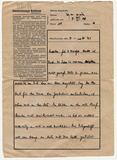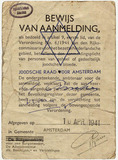Grete Weil
Grete Weil
Vielleicht bin ich deshalb am Leben geblieben, weil meine Zeugenschaft nicht ausreichte.
[Perhaps I have stayed alive because my testimony was insufficient. (ed. trans.)]
Grete Weil
| Born | on 18 July 1906 in Egern in Upper Bavaria, Germany |
|---|---|
| Died | on 14 May 1999 in Grünwald near Munich, Germany |
| Exile | Netherlands |
| Remigration | Federal Republic of Germany |
Grete Weil found broad public recognition as a writer only in old age. Inspired by the reception and recognition that she enjoyed since the beginning of the 1980s, for example, after being awarded the Geschwister-Scholl-Prize, she published several novels and volumes of short stories. Grete Weil may have written her first story in January 1933, yet her escape, persecution, war, existential necessities and finally the attitude of German post-war society towards emigration had for a long time prevented her from dedicating herself to her writing.
Grete Weil grew up in an upper-middle class Jewish family in Munich. The family’s acquaintances included Oskar Seidlin, Doris von Schönthan and Klaus Mann. In 1933 she interrupted her study of German literature and together with her husband Edgar, who worked as dramaturge in the theatre Münchner Kammerspielen, decided to emigrate. While Edgar Weil organised the relocation of his parents’ pharmaceutical factory to the Netherlands, Grete finished her studies in Munich as a photographer. In 1935 they went into exile in Amsterdam, and Grete Weil took over a photography studio there in 1938. After Germany’s occupation of the Netherlands, Egdar Weil was deported to the concentration camp Mauthausen where he was murdered. Grete Weil survived, first as a member of the Jewish Council and then in the underground.
In 1947 she returned to Germany to her childhood friend Walter Jockisch, whom she married in 1960. Grete Weil died on 14 May 1999 in Grünwald near Munich.
Selected works:
Ans Ende der Welt (Erzählung, 1949)
Tramhalte Beethovenstraat (Roman, 1963)
Meine Schwester Antigone (Roman, 1980)
Generationen (Roman, 1983)
Der Brautpreis (Roman, 1988)
Further reading:
Exner, Lisbeth: Land meiner Mörder, Land meiner Sprache. Die Schriftstellerin Grete Weil. München: A1 Verlag 1998
Weil, Grete: Leb ich denn, wenn andere leben. Zürich/Frauenfeld: Verlag Nagel & Kimche 1998







